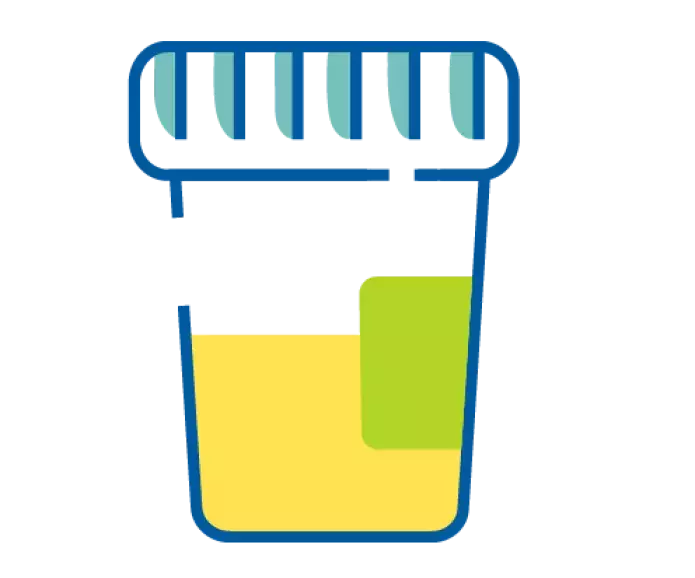
Urine tests for kidney disease

- Medically reviewed by
- Shahzia Lakhani
- Last updated
- August 7, 2025

What are urine tests?
A urine test checks your pee (urine) to help your medical provider understand more about your health. It can show changes or substances like protein or blood that may be signs of kidney disease and other health problems. Regular testing can show changes to your kidney health over time. It’s especially important for those with risk factors for kidney disease, such as diabetes, high blood pressure, or heart disease.
Why are urine tests used?
Urine tests help your doctor:
- Measure your kidney function
- Find out what stage of kidney disease you are in
- Keep track of health problems that can cause kidney disease, such as diabetes
- Check for complications (problems) from kidney disease, such as anemia and metabolic acidosis
- Check for other problems, such as a kidney infection or a urinary tract infection (UTI)
- Measure protein levels
Your kidneys filter all the blood in your body and remove extra fluid and waste products such as urine. When your kidneys are damaged, they aren't filtering your blood well. One of the earliest signs of damage can be protein in your urine. A urine test can find kidney disease early before the kidney is severe. By repeating urine tests as time passes, your doctor can see if the damage to your kidneys is getting worse.
What are the different types of urine tests?
Doctors use different tests to look for different things:
- Visual exam: Doctors look at the urine sample to:
- See its color — dark yellow or brown urine may suggest a problem
- Check if it is foamy, cloudy, or has an unusual smell, which can be signs of a problem
- Microscopic exam: Doctors look at a small amount of urine under a microscope to check for signs of problems, such as:
- Bacteria, which may be due to an infection
- Crystals, which may be signs of kidney stones
- Red or white blood cells, which may be a sign of an infection or other kidney problems
- Dipstick test: Doctors dip a thin plastic strip into your urine, which changes color to show the levels of:
- Blood, which can be a sign of problems such as infection
- Protein, which can be a sign of kidney disease
- Glucose (sugar), which can be a sign of diabetes in high levels
- Acidity (pH), which in abnormal levels can be a sign of problems, such as a UTI

Albumin-to-creatinine ratio (uACR):
The urine albumin-to-creatinine ratio (uACR) is a urine test that measures the amount of albumin (a type of protein) in your urine compared to the level of creatinine. This ratio helps doctors determine how well your kidneys are functioning. A UACR test is often used to detect early-stage kidney damage, especially in people at higher risk, such as those with diabetes or high blood pressure.
For the uACR test:
- You will give a small sample of urine (about two tablespoons).
- Your urine sample is sent to a lab to see the amount of albumin (the main protein that should normally be in your blood) and creatinine (a waste product in your blood that comes from your muscles). If your kidneys are damaged, they may leak albumin into the urine.
- Your doctor will compare these levels to figure out your UACR.
If your UACR is more than 30 mg/g, ask your doctor when you should get the test again. Regularly testing your UACR can detect changes in kidney health over time. Early detection of albumin in your urine can help to monitor disease and determine treatment.
Urine culture: If your doctor suspects you have a kidney infection or UTI, a urine culture can show if and what type of bacteria is present.
- Early detection through a urine culture helps prevent the spread of infection to the kidneys and other parts of the urinary system.
24-hour urine test measures overall kidney function by collecting all the urine you produce in a day. This test provides a detailed picture of your kidney's ability to filter waste, especially when checking for proteinuria (excess protein in the urine), a key indicator of kidney health. Doctors often recommend a 24-hour urine test when a more detailed analysis is needed beyond a standard one. It can also measure various factors, including protein, creatinine, calcium, and other important substances, to give a comprehensive view of kidney function.
To do this test, your doctor will give you one or two large containers to collect your urine over 24 hours. They will also give you a special pan that fits in your toilet or a urinal to collect your urine. You will then transfer your urine from the pan to the container.
Here is an example of what you might do:
- When you first wake up, you will flush your urine from your first time urinating.
- For the next 24 hours, you will collect all urine in the pan and container (you will not flush any urine down the toilet during this time). Do not urinate directly into the container.
- Store the container in the refrigerator or on ice until it is returned to the lab.
- After 24 hours, you will bring it to a lab. The lab will test your urine for:
- How much urine you make in a day
- The acidity (how much acid is in your urine)
- The amount of certain substances, such as:
- Protein
- Creatinine
- Calcium
- Sodium
- Uric acid
- Oxalate
- Citrate
Ask your doctor how often you should have this test.
- Nephrin test: The nephrin test is a urine (pee) test that may detect kidney damage early. Research is currently ongoing on testing nephrin as a future test for detecting kidney damage.
What happens during a urine test?
During a urine test, you will urinate (i.e., pee) into a container with a lid that your doctor provides. You may have a urine test at your doctor's office, or your doctor may give you urine sample cups and sterile wipes to collect urine at home.
To make sure the urine sample is not contaminated, use the clean catch method:
- Wash your hands with soap and water.
- Use a sterile wipe to clean the area where your urine comes out.
- Start to urinate in the toilet.
- Stop the urine stream and then urinate into the container.
- After you fill the container, finish urinating into the toilet.
Your doctor should follow up with the results of your urine test and discuss them with you. Ask questions if you do not understand what the results of your urine test mean for your kidney disease or what to do next.
Here are some helpful questions you might ask your doctor:
- Did I have protein in my urine?
- What does my uACR result mean for my kidney health?
- When is the next time I should have my urine tested?
- What steps can I take to prevent further kidney damage?
- Based on my test results, are there any lifestyle changes or treatments you recommend?
- How does this test result fit with my eGFR or other kidney function tests?
- What is my risk of progressing to kidney failure?
Do I need to do anything before a urine test?
You can usually eat and drink normally before a urine test. If you are having other tests at the same time, such as blood tests, your doctor will tell you how to prepare.
Let your doctor know about any medicines, vitamins, or supplements you take since these can change the results of urine tests.
Regular urine testing is crucial for individuals with conditions like diabetes, high blood pressure, cardiovascular disease, or a family history of kidney disease. Urine tests should be a regular screening to catch any early signs of kidney damage. The frequency of these tests depends on your kidney disease stage and risk level. Regular testing can help your doctor track any changes over time.
Urine tests work best alongside other tests, such as eGFR and serum creatinine, to give a complete picture of your kidney health. Early and consistent testing can help manage kidney disease progression for those at higher risk.

When your kidneys are damaged, one of the earliest signs can be protein in your urine. A urine test can find kidney disease early, before the damage to your kidneys is severe. By repeating urine tests as time passes, your doctor can see if the damage to your kidneys is getting worse.

